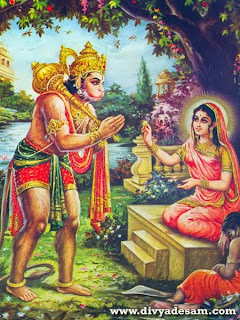Continued
From: http://thoughtsonsanathanadharma.blogspot.ca/2013/12/srimadh-bagawatham-parasurama-charitram.html
Ramayana:
 |
| Vaduvur Ramar |
Morals in Ramayana:
Everyone knows the story of Ramayana; hence, let us concentrate on the morals to be learned from Ramayana and on the esoteric meaning of Ramayana.
Ramayanam
is the dramatic version of Bagawad Geetha. Whatever Lord Krishna preached in
the Bagawad Geetha, Lord Rama dramatized in Ramayana.
Balakandam:
 | |
| http://www.krishnasmercy.org/dotnetnuke/Teachings/TheSpiritualMaster/tabid/94/Default.aspx |
Lord Rama
incarnated during Treta Yugam to re-establish the dharmam of obeying those who
are older than us. There is no temple more superior to our mother and the words our father
are the best manthrams in life. In Bala Kanda, Sri Rama agreed to accompany
Sage Vishwamithra without arguing with his father.
Ayodhya Kanda:
 |
| www.glimpseofkrishna.com |
In Ayodhya Kanda, Lord Rama has taught us to accept pain and pleasure
with equal outlook. Lord Rama was happy when King Dasaratha informed Him about
the plan to crown Him as the emperor.
Lord Rama was informed by His step mother Kaikeyi on the day of the
coronation ceremony that Bharathan would be crowned as the next king and Lord
Rama would have to go live in the forest for 14 years. Lord Rama did not feel
sad or angry when He heard Kaikeyi’s words as He accepted both profit and loss
equally. He was happy when He was told that He would inherit the kingdom and He
still remained happy when He was told that He wouldn’t inherit the
kingdom. Lord Krishna preached the same
concept in Bagawad Geetha when He instructed everyone to accept profit-loss and
pain-pleasure equally.
Aranya Kanda:
In Aranya Kanda Lord Rama has showed us the value of Sat Sangam. He has
instructed us to stay close to Bagawathas and learn about Bhagawath Vishayams.
We can find true joy only through Sat Sangam.
Kishkinda Kanda:
Sundara Kandam:
Sundara
Kandam speaks about Acharya Vaibhavam and the importance of an Acharyan in
helping us reach the Lord’s divine feet. Lord Hanuman is the Acharyan while
Sita Piratti is represented as the jeevatma longing to reach the Lord. Lord
Hanuman was also unable to locate Piratti by his efforts. He could find Piratti
only after praying to Perumal and Piratti to help him. Perumal and Piratti have to reveal
themselves to us for us to be able to reach them. Our efforts don’t reach us to
their divine feet but it is their grace which makes it possible.
Yudha Kandam:
 |
| www.salagram.net |
The Yudha Kandam teaches us about forgiving our enemies. Lord Rama instructed
Vibhishnazhwar to perform the last rites for Ravana because people should learn
to let go off grudge when a person is dead. Does Lord Rama’s statement mean
that He held a grudge against Ravana till the time Ravana was killed? No, Lord
Rama’s statement means that Ravana hated Perumal only when he was alive; as
soon as he died, the jeevatma which was previously in Ravana’s body no longer
hated Perumal. Perumal always loved Ravana since He cares for all jeevatmas
with love; it is because of His love for the jeevatma in Ravana’s body that he
gave it many chances to repent its mistakes.
Continued On:





No comments:
Post a Comment
Note: only a member of this blog may post a comment.